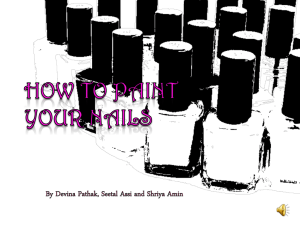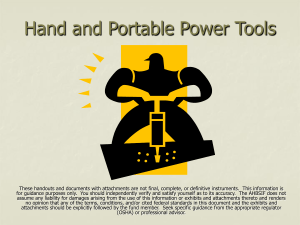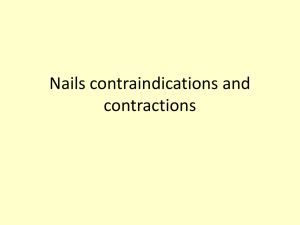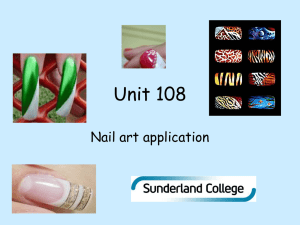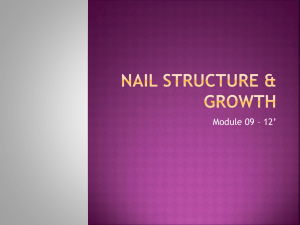Nail Tips and Wraps
advertisement
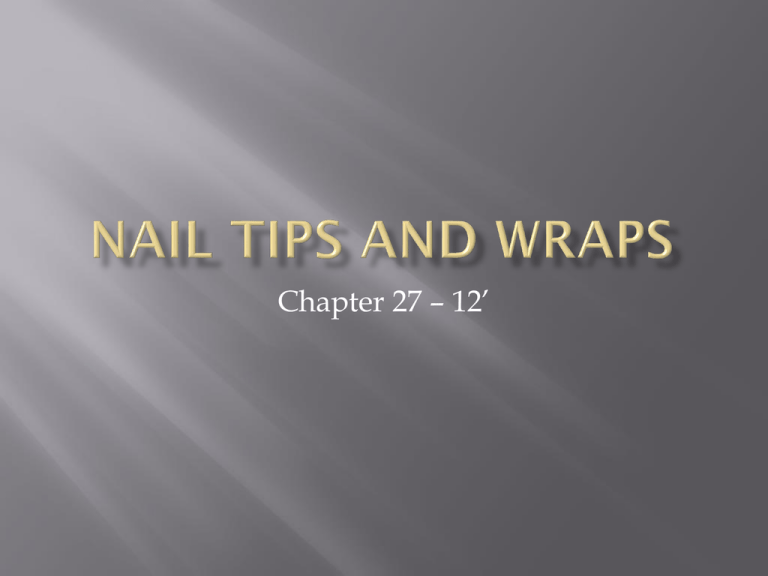
Chapter 27 – 12’ Nails can be made any length Variety of products can be applied over tip to strengthen Offering extension services expands your service offerings and enables clients to have a “one stop shop” experience Learning proper techniques for applying and removing nail tips will aid in helping your client to keep natural nails in the best possible health and condition Understanding the types and uses of nail wraps will enable you to determine your client's specific need Learning how to safely and correctly apply, maintain, and remove nail tips and wraps will ensure your client’s happiness and loyalty. Plastic, pre-molded nails shaped from tough polymer made from acrylonitrile butadiene styrene (ABS) Add extra length to natural nail Support for nail enhancement products Overlay – layer of any nail enhancement product applied overtop for added strength Tip cutter – specialized tool for cutting nail tips FYI box PP 875 Nail dehydrator – substance used to remove surface moisture and tiny amounts of oil “Well” – point of contact with nail plate Position Stop – Point where free edge of natural nail meets nail tip Tip is adhered to natural nail Many sizes, colors, and shapes Purchased in large containers or individual refills Exactly cover nail plate from sidewall to sidewall DO NOT use tip more narrow than nail plate Will cause a crack at sides or split down middle Use abrasive board to tailor tip before applying Bevel and trim “well” before applying Less filing Less potential for damage Nail tip adhesive – bonding agent to secure tip to natural nail Gel adhesives – Resins Thicker Require longer “set” or drying time Containers come in Pointed applicator One-drop applicator Brush-on Always wear eye protection Contact are will need to be blended Should be NO visible line where tip stops and natural nail begins Nail Tip Application pages – 879 – 881 Cause serious injury if gets into eyes Caution Box PP 880 Service Tip boxes PP 880 - 881 Nail Tip Removal – PP 882 – 883 Caution Box PP 883 Any method securing a layer of paper or fabric on or around the nail/tip to strengthen and durability Used to repair or strengthen or create nail extensions Nail resin – Made from cyanoacrylate Polymerizes in seconds Fabric wrap Silk Linen Fiberglass Cut to cover nail surface Laid in layers of resin to build and strengthen enhancement Silk wraps Thin natural material Tight weave Becomes transparent Lightweight and smooth appearance Linen wraps Closely woven, heavy material Thicker and bulkier than other types Adhesives do not penetrate as easily Opaque – colored polish to cover Strongest fabric Fiberglass Very thin synthetic mesh with a loose weave Easy to use Resin penetrates – improves adhesion Not as strong as linen or silk Paper wraps Temporary service Very thin paper First material used Do not have strength and durability of fabric wraps Wrap resin accelerator Activator Acts as dryer that speeds up the hardening process of resin or adhesive overlay Brush-on Pump Spray-on Aerosol 2 minutes after applying Do not apply additional wrap resin or it may harden on tip applicator Does not need to be applied after every layer of adhesive FYI – box PP 877 Nail Wrap Application PP – 884 – 886 Service Tip box – PP 885 Maintenance - nail enhancements need to be serviced as/after growing out Fill Backfill Structurally correct nail to ensure strength, shape, durability Rebalance Two-Week Fabric Wrap Maintenance PP 887 888 Fabric Wrap Repair Stress strip – Small piece of fabric used to strengthen a weak point or break Cut 1/8” in length Apply to weak point Used to strengthen or repair Repair Patch – piece of fabric used to cover a crack or break Four-Week Fabric Wrap Maintenance – PP 889 - 891 Fabric wrap removal Remove wraps carefully so no damage to natural nail Immerse in acetone Wrap melts away and gently push off with wooden pusher Rehydrate natural nail Fabric Wrap removal – PP 892 – 893 Business Tip box – PP 878


